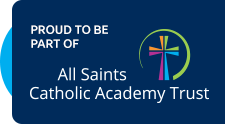Religious Education
Intent
As a Catholic school, RE lies at the heart of our curriculum and school life. The teachings of the Gospels are at the centre of everything we do and we strive to ensure that the Christian values show themselves not only in the RE lessons but at all times. We are committed to the Catholic Faith, recognising and valuing every individual as special and unique in the image and likeness of God. Religious Education at St. Albert the Great Catholic School, respects and promotes each child’s innate capacity for wonder, awe, reverence and spirituality.
Throughout our RE Curriculum the pupils are taught about God’s love; they learn about their Christian responsibilities; pupils are provided with experiences of church, Catholic and Christian traditions, as well as being taught to be respectful and understanding of people and traditions from other faith backgrounds. Through Religious Education our pupils learn about their unique place within the home, school and parish community.
The intent of our Religious Education curriculum is to:
- Enable pupils to continually deepen their religious and theological understanding and be able to communicate this effectively;
- To present an authentic vision of the Church’s moral and social teaching so that pupils can make a critique of the underlying trends in contemporary culture and society;
- To raise pupils’ awareness of the faith and traditions of other religious communities in order to respect and understand them;
- To develop the critical faculties of pupils so that they can relate their Catholic faith to daily life;
- To stimulate pupils’ imagination and provoke a desire for personal meaning as revealed in the truth of the Catholic faith;
- To enable pupils to relate the knowledge gained through Religious Education to their understanding of other subjects in the curriculum;
- To bring clarity to the relationship between faith and life, and between faith and culture
- To encourage pupils to respect and be fully aware of the needs of others as equal members of God’s
Implementation
The RE curriculum follows the Diocese of Westminster’s programme of study ‘To know You more clearly’. The programme of study for religious education in Catholic schools presented in this directory has a framework with four structural elements: knowledge lenses, ways of knowing, expected outcomes, curriculum branches.
Each half term is focuses on a different ‘branch’ and each branch has expected outcomes that the lessons are based around.
Through our curriculum we aim:
- To enable children to foster and develop a life-long relationship with God
- To teach children about the beliefs, teachings and rites of their Catholic faith
- To teach children to be able to discern right from wrong; that actions have consequences and the value and importance of forgiveness
- To enable children to be creative and to develop their own thinking
- To develop children that are increasingly confident in taking an independent approach to their learning
- To enable children to be able to live and work co-operatively with others
Catholic Social Teaching (CTS) is taught throughout the RE, PSHE and RSE curriculum. We follow the 6 CST themes set out in Rooted in Love - Care for Creation, Preferential Option for the Poor, Solidarity and Peace, Community and Participation, Dignity of workers, and Dignity.
Rooted in Love is a Religious Education resource for primary schools, developed in partnership with the Diocese of Westminster Education Service and funded by the ALF grant. It addresses the objectives relating to Catholic Social Teaching from the new Religious Education Directory, including prayer and liturgy ideas around each theme, as well as suggestions for bringing this work to life in the Catholic life and mission of the school.
Impact
Our RE curriculum will provide pupils with a deep understanding of Catholic faith and religion, helping them to gain a sense of identity, purpose, and the guidance they need for their life. Pupils are encouraged to develop positive and respectful attitudes towards people of different faiths and beliefs; appreciate the diversity within society, ethical issues, and political, cultural, and social attitudes. As a result, pupils can look beyond their immediate surroundings, contribute positively to their communities, and see themselves as active citizens. Additionally, pupils must have a strong moral ethic and a deep sense of the values that Catholic schools hold in high regard. Their richer experiences are developed into life-long learning practices.
Home/School/Parish Partnership
The school works in partnership with parents and parish to enrich the lives of our children.
We distribute a weekly newsletter to inform parents about the weekly Gospel theme and notify parents of Masses and liturgies both in the school and the Parish.
Our School regularly supports Parish events and fund raising e.g. CAFOD, SVP, Advent appeals, Lenten appeals.
We have a pupil led chaplaincy team, the Friends in Faith, who strive to create stronger links with our wider parish community through a variety of different initiatives such as our annual Harvest afternoon tea and Christmas cards.
Pease visit our Catholic Life pages of our website to find more information on how our faith is reflected in our school life.
Prayer and Liturgy
Our Catholic faith is central to day to day life of our school and all aspects of the curriculum, and pupils are encouraged to recognise the importance of their faith and they respond to all forms of liturgy and collective worship with respect and reverence.
We have a rich liturgical life in that the experiences we provide are wide ranging and take place in school, out of school, in Church and the wider community, and engage and involve pupils, parents, staff, governors and the parish.
The Celebration of the Eucharist and prayer are central in our school. Our Parish Priest regularly celebrates Mass in School. In addition, we aim to join our parish community at Mass at least once every term as well as for Holy Days of Obligation such as Ash Wednesday.
To know You more clearly - RED




